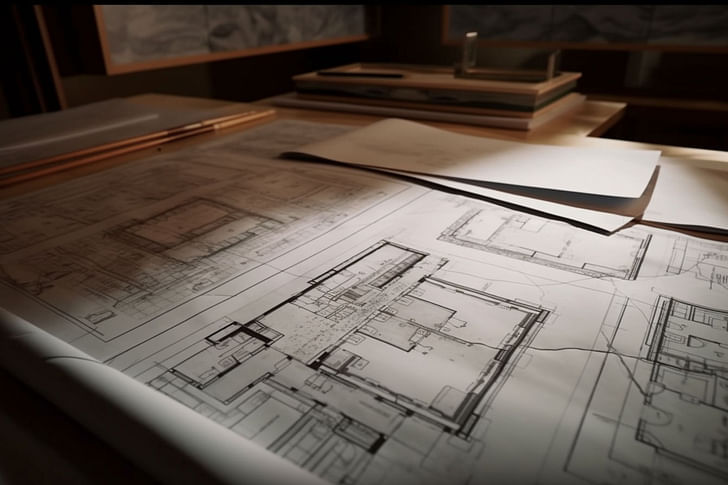

As we continue our ongoing Archinect In-Depth: Licensure series, we highlight perspectives from individuals with extensive research backgrounds on the topic, as well as those in positions to lead, guide, and evolve the licensure pathway. Additionally, we launched a survey among Archinect readers, many of whom are either experiencing or have completed the path to licensure, to hear about their own views and challenges.
We have now analyzed and collated the responses shared by our community into a series of ten key reflections. Stay tuned for more Archinect In-Depth: Licensure features, which will include commentary on some of the reader perspectives shared below.
When respondents were asked for their general views on the path to licensure, the most common concern expressed was the lack of time candidates feel they have to devote to studying for the ARE. In particular, the demands of overwhelming workloads in practice have required candidates to sacrifice their personal lives to devote themselves to exam preparation. Frequent overtime demands in the office further limit the available time left to study, with some respondents telling us their work weeks can exceed 50 hours.
It requires a graduate-level academic commitment from the person while maintaining a full-time job and also balancing a personal life. — Archinect survey respondent
“Acknowledging the already exploitative labor practices within architecture, no professional degree-bearing individual should be forced to choose between engagement with an opaque, laborsome licensure process and time for oneself,” a licensure candidate in New York City told us. “Nor [should they have to] consider sacrificing fulfillment at work to gain support or time for the licensure process.”
“It is an arduous and unnecessarily complicated process,” another New York City candidate noted. “It requires a graduate-level academic commitment from the person while maintaining a full-time job and also balancing a personal life. There needs to be a better way to get licensed; a method that seamlessly integrates practice with licensure.”
Alongside time constraints, the financial commitment to licensure was the most frequently cited struggle among respondents. The costs associated with exam fees and study materials have caused financial strain, compounded by the low early-career salaries that many respondents find themselves on.
“I’ve been trying to pass for five years now,” one Atlanta, GA, candidate told us. “I’ve spent thousands of dollars, and I’m at the point where I simply cannot afford the expensive study materials.” Meanwhile, a candidate from Seattle, WA, told us: “The cost of study materials is astronomical. It feels like pay-to-play. The all-in cost is several thousand dollars, not including the master's degree necessary to become eligible, on top of a bachelor's.”
I’ve spent thousands of dollars, and I’m at the point where I simply cannot afford the expensive study materials. — Archinect survey respondent
Mitigating against such burdens, some respondents reported that their firms have financially supported their path to licensure. “I would not have gotten licensed if my firm had not reimbursed me for the cost of the tests and provided me with study materials,” an early-career licensed architect from Columbus, OH, told us. However, other candidates with similar circumstances told us that the reimbursement of fees by firms only after licensure was completed did not solve cash-flow issues during the process itself.

As part of the survey, we asked if candidates felt supported by their firm and/or school on their path to licensure. Approximately 25% of candidates told us that they felt supported by their firm, with specific benefits cited, including financial compensation for exams, study resources, mentoring, and time relief. “My current employer wants more licensed individuals,” a candidate in Boston, MA, told us. “They are purchasing ARE exam prep and are working on a program to reduce costs of exams themselves.”
In contrast, only 7% felt supported by their school. While some noted that professional practice courses in their graduate school served as a valuable stepping stone on their pathway, many felt that licensure and professional administration did not feature enough in their curriculum.
Architecture students are barely prepared to start their professional experience because they are taught the idealistic theory of design, not how to function as a worker. — Archinect survey respondent
“Graduate school emphasized various subject areas that provided a foundation for ARE prep, such as Practice Management & AIA contracts, but by and large the attitude was that school was where you learn to design, and everything else is to be learned on the job or on your own time,” said one respondent from San Diego, CA, who recently passed the ARE.
Ultimately, a majority of respondents did not feel adequately supported by either their firm or school, with one current candidate in Miami, FL, telling us: “Architecture students are barely prepared to start their professional experience because they are taught the idealistic theory of design, not how to function as a worker. Licensure is given so much importance but yet no employer has been flexible with my needs concerning licensure.”
Reflecting on their experience of the licensure path, several candidates cited the benefit of the AXP, offering a vehicle to gain hands-on experience within their office. “The experience gained by the required AXP program is definitely needed and well rounded,” an early-career architect in White Plains, NY, told us. “It made my exams relatively easy.” Meanwhile, a current licensure candidate in Miami, FL, told us: “The IDP or AXP is somewhat lengthy, but I believe it is a necessary step.”
The experience gained by the required AXP program is definitely needed and well rounded. — Archinect survey respondent
While respondents were supportive of experience requirements, some expressed concern over a lack of willingness for firms to engage with their experience requirements. “The most challenging aspect was finding support from professional colleagues and my firm to get the experience I needed for both the AXP and experience that would be beneficial to the exams,” an early-career architect in Atlanta, GA, told us.

While support was expressed for the AXP, many respondents felt that the ARE does not accurately reflect the realities of architectural practice. “Passing the exams is a matter of test-taking skills,” a current licensure candidate in New York City told us. “It doesn't prepare you for the reality of working with so many different consultants. Experience does.”
In particular, several candidates expressed concern over the standardized and, to some, ambiguous nature of the exams and the barriers they may create. “I have ADHD and have trouble with standardized tests,” a current candidate in Los Angeles, CA, told us, while an early-career architect in New York City said: “I think aiming for the questions to trick us is disrespectful. Some of the smartest colleagues I’ve ever had continue to fail for this reason. We should be tested on content alone.”
Passing the exams is a matter of test-taking skills. It doesn't prepare you for the reality of working with so many different consultants. Experience does. — Archinect survey respondent
“I have only taken standardized tests once before (SATs), so the most challenging part was the test format,” a former candidate in New York City who has since left the path to licensure told us. “I knew the information going into the test, and I know I am good at the technical/information retention parts of my job, but taking this type of test is a skill that does not reflect one’s intelligence. Standardized multiple-choice tests are based in white supremacist systems of education that I believe is part of the reason we continue to see disparities in who is licensed.”
The pressure of balancing work, study, and personal lives has taken a toll on the mental and physical health of several respondents in our survey. Many candidates reported experiencing burnout and stress, both from preparing to take the exams and as a result of failing to pass.
“Failing exams has been detrimental to general self-esteem even though work performance reviews have been great,” a current candidate in New York City told us. “This creates a lot of imposter syndrome frustrations and also working more than needed due to the need to prove yourself.”
Failing exams has been detrimental to general self-esteem even though work performance reviews have been great. — Archinect survey respondent
“It is hard enough to work 50+ hours, but needing to continue studying into late hours of the night has impacted my overall physical and mental health,” a current candidate in Miami, FL, told us, while an early-career architect in New York City said the most challenging aspect of their path to licensure was: “The anxiety, self-doubting and fear of 'What if I fail again? Do I have the courage to retry? Can I ever accomplish this in my life?'”

Several respondents in the survey noted that their experience of the licensure process was impacted by their race, gender, and family circumstances. “As a woman, I feel that getting married, having children, and not having a position in a firm were all detrimental to my ability to complete the exams,” said one former candidate from Chicago, IL, who has abandoned the path to licensure. A current candidate in San Diego, CA, told us: “I'm married and have a young son, which shouldn't jeopardize the path to licensure, but it certainly does,” while a current candidate in New York City wrote: “I never thought that I had a glass ceiling until I realized that this is it. I don’t think I’ll be able to ever break it.”
I'm married and have a young son, which shouldn't jeopardize the path to licensure, but it certainly does. — Archinect survey respondent
Elsewhere, a current candidate in New York City told us that “working towards licensure in the U.S. as a non-white female has been a very isolating experience for me,” while a separate candidate in the city wrote: “I'm expected to fully function with overtime at work in order to stay employed, then come home late and study for exams. I’m the only Black person in my office, so my performance is constantly under scrutiny. And I dare not fail these expensive exams, given the amount I've paid out of pocket for study materials and the exams themselves. It's a lot of unhealthy pressure for me.”
In our survey, we asked readers what changes or reforms they would like to see in the licensure process. Among the most frequent requests from respondents was to integrate licensure requirements into educational curricula, provide better financial support, modernize exam content, and create alternative paths for experienced professionals.
Many respondents called for architecture schools to play a larger role in preparing and conducting licensure examinations, with a current candidate in Chattanooga, TN, suggesting a “test you can take at the end of your master's degree at the school and a specific class on the ARE.” A current candidate in New York City told us that “licensure should occur as part of our professional education, full stop,” while a separate New York City candidate similarly called for “better integration of licensure and architectural education.”
If you can prove that you have led the creation of full drawing sets, worked with local jurisdictions, led CA on a built project, etc., you should be able to get licensed without tests. — Archinect survey respondent
In addition to a stronger presence of licensure in architecture schools, other respondents called for alternative pathways for those who have several years of experience in practice. A current candidate in Denver, CO, called for an “option for shortcutting the process after you have 10 years of experience,” while a former candidate in New York City who left the licensure path wrote: “There should be options to take tests (highly supported by courses in school and test prep courses after graduation), but there should also be an option to become licensed after 10 years of experience with certain milestones hit. If you can prove that you have led the creation of full drawing sets, worked with local jurisdictions, led CA on a built project, etc., you should be able to get licensed without tests.”

Several respondents to our survey saw limited professional or financial incentives to pursue licensure, especially if they didn't plan to start their own firm or become partners. “Now that I am further down my career and not in the traditional path, I see that the license does not provide any increase in salary,” a former candidate in New York City told us. “It only provides a benefit if you want to have your own firm or become a partner.” Elsewhere in New York City, a current candidate wrote: “I see licensure as the most beneficial to starting your own firm, but I do not think that is a financially feasible option for my future at this time.”
I don’t think that licensure is any measure of professionalism and will give me nothing besides the legal right to call myself an architect. — Archinect survey respondent
“At the mid-point in my licensure path, I realized that I didn't need to be licensed because my firm signed off on all projects and for several years were not promoting or giving even cost of living raises,” a former candidate in Chicago, IL, told us, while a current candidate in Houston, TX, shared that their experience has been “frustrating because the time and energy put into obtaining licensure is seemingly not worth the benefits reaped from it.”
“I have nine years of work experience and no interest in licensure,” a designer from New York City added. “I don’t think that licensure is any measure of professionalism and will give me nothing besides the legal right to call myself an architect.”
In contrast to those who did not see the value in licensure, other respondents told our survey that completing the path increased their confidence, knowledge, and sense of value. “I am really happy I got licensed,” an early-career architect in New York City told us. “It’s been very advantageous as my career has progressed.” Meanwhile, an early-career architect in San Francisco, CA, wrote that having completed the path, “I felt more confident and knew that I could command more in a salary.”
I am really happy I got licensed. It’s been very advantageous as my career has progressed. — Archinect survey respondent
“I have not completed the process, but I do believe I have learned and increased my confidence in the process,” a current candidate in San Diego, CA, told us, adding, “I am a better architect.” Elsewhere, an early-career architect in Newark, NJ, said that licensure “reinforced the focus and determination required to practice architecture. It also sets a baseline of knowledge to get started.”

The Archinect Path to Licensure Survey was open for responses from August to October 2022. During that time, 130 responses were received. The geographic spread was balanced across the U.S. regions, with the Northeast providing the largest number of responses (44%), followed by the West (19%), Southeast (14%), Midwest (12%), and Southwest (5%).
42% of respondents were currently on the path to licensure, while 39% had completed the path. 8% did not wish to pursue the path. Respondents were split evenly by gender, while the most common race/ethnicities among respondents were 'White' (65%), 'Hispanic or Latino' (15%), 'Asian' (10%), and 'Black or African American' (7%).
Niall Patrick Walsh is an architect and journalist, living in Belfast, Ireland. He writes feature articles for Archinect and leads the Archinect In-Depth series. He is also a licensed architect in the UK and Ireland, having previously worked at BDP, one of the largest design + ...
18 Comments
Thanks for this compilation Niall,
I am now a 40-year experienced and licensed Architect and I recall vividly, the days of studying for, and taking the ARE, beginning in 1984. I had fantastic support from my school, primarily in the form of my 5th year studio professor, Willard MacGonigal, in that he was a former examiner and did two things which were primary to my performing so well on my initial testing week. 1. He was able to obtain real sets of a prior years Design Exam and, on a voluntary basis, almost everyone in our studio opted to take a Saturday and sit for a mock 12-hr exam, 8:00 - 8:00. On the Sunday following, we all sat for crit's, and his final opinion on whether or not each of us might have passed. It was and invaluable experience. 2. Mr. MacGonagil also wrote a letter, on behalf of each of us in the studio, that, having reviewed our transcripts, there was every reason to believe that we ( individually ) would be receiving our 5-yr B.Arch degree that June, and therefore qualified to sit for the exam that year. We were able to register for the exam because of that. While everyone was celebrating graduation, I remember having the time, not so much to "party," but to sit and study in earnest for my ARE which was a week or two from the date of my commencement. Again - invaluable, and essentially, a year's head start.
Though I passed 7 of the 9 sections on my first attempt, it still took me another year to pass the Documents and Services portion, and a third to finally complete Building design. In retrospect, I believe it actually required those years of working in the profession to give me the experience, and confidence to pass those sections. Remarkably, I was able to pass my written and oral exams, and still had 6 months or so of work-experience (apprenticeship) to finally meet all requirements for licensure
I continue to value my license both in terms of my personal effort to achieve it, and the responsibility I continue to hold in operating under it. I do, however believe that there should be other means through which one could achieve and obtain the "minimum professional competence" which licensure is supposed to demonstrate. Those means should still be rigorous in their depth and breadth, toward the end goal of the protection of public health, safety and welfare, however.
To all the young folks now involved in that effort and struggle, I wish you peace and professionalism !
We are producing far too many architects in the definition of licensed professionals. Thie current method is destroying the profession in the light of overall responsibility within the built environment. The 5-year first professional degree is totally inadequate for the demands of modern practice. The alternate route of employed apprenticeship as opposed to an academic degree is also a relic.
A rigorous 4 year pre-architecture undergraduate degree with an adequate liberal arts and sciences curriculum (Including the calculus and appropriate applied physical mathematics.) leading to a 3-1/2 year masters degree is proposed. Then a structured 4 year internship under a monitored national program (Such as NCARB.) prior to an application to sit for the exam. It is suggested the scope (breadth and depth) of the exam not change including a return to the old design portion with pencil and paper. This, with more stringent parameters for accomplishment. That the design portion be considered only after the intern period in order to better assure a more full understanding of the documents, their interaction and meaning. Meaning, in the professional sense of the term. The license, per se, should remain the province of each state and the application for multi-state licensure subject to each state's licensing board's review.
Matters such as Urban and Regional Planning and built environment economics (not real estate) or other academic/professional concerns should be left to more advanced studies under qualified academic programs, not this continuing education nonsense as is currently perpetrated.
Respectfully;
I think it all depends on the quality of the education. I've seen five year BA's and five year MArch's that produce well rounded, educated and informed interns.
I don't think we're ever produce decent architects right out of school. I suspect the best we can do is create a good base of knowledge and critical thinking skills that will help guide new interns into this profession.
Educate people to be smart - I've seen intelligent BAs quickly move ahead and surpass those with 3 year M.archs and others with years of experience - critical thinking is the key
I have 14 years experience, the lack of license has me perceived as a deadbeat, with low career progression as compared to my less experienced but more successful co-workers who get the breaks- I ask for tasks that lead to licensure. Firms just want to use me as a helper for Revit and as a job captain - no licensure track. "That's not what we hired you for" - Consequently, I've had to create my own projects on the side and pursue an alternative licensure track.
What country are you practicing in?
US, California
Interesting. I'm not familiar with CA's alternate paths to licensure. I didn't know you could create your own projects and then self report you AXP hours.
I also have 14 years experience, I am licensed, but in reality I'm a total deadbeat. So I guess we're opposite-sies!
Chad - NCARB - alternative path to licensure - portfolio path
Interesting.
According to NCARB to do the portfolio path:
I assume you have a license in a US jurisdiction.
Academia has proved to be a huge money and time suck from professional practice. What should happen is a new 2-year programs completely separate from universities that focus on getting license and practice. Not the kind of high-design that is nice for undergrads but not grad school.
I'm not sure that a two year program would be enough to pass the ARE. It could work though. Basically it would be a five year B.Arch and a 2 year professional practice type program.
Or a traditional 4 year university arch program and then a 2 year program that has professional office work instead of studio and license test at the end. The whole arch grad school system should probably be shut down. There's no reason why english majors should be getting arch degrees -- it's the root of a lot of the soft art-ification of architecture.
It could work. I do know many programs that only offer an M.Arch to people with a 4 year arch degree. My degree was a five year B.Arch. It was a selective admission program based on GPA from your first year. We had studio from the second semester of the first year. The program was very structured. It contained detailing and professional practice courses. The final year was your thesis project. The program is now a six year M.Arch. Really nothing has changed in the program.
There's a whole lot of truth in this article! Architectural education (even expensive design schools, I'm looking at you CCA) places no emphasis on actual practice. The worst advice I was ever given was from a "career counselor" who told me "don't get an internship until the last possible time you can." Very likely because he knew that I would be shocked at the difference between practice and design school.. There is no reason that architecture schools shouldn't completely and utterly prepare you for licensure. To those of you who don't have your license, and think you don't need one, well I practiced for many years without my own, because my firm did all the signing, and they didn't pay you more either, but once I got one, doors, that I didn't know existed, opened up for me. P.S. I got mine with three young kids and a full+ time job, you can do it too!
On thing that I've see programs do (mine included) is that one of your later studios functions like an office. This includes things like: writing proposals, clients changing their minds, RFI's, ect.
CCA? A lot of my co-workers in SF came out of there - then and the ones from Cal are pretty sharp
Block this user
Are you sure you want to block this user and hide all related comments throughout the site?
Archinect
This is your first comment on Archinect. Your comment will be visible once approved.